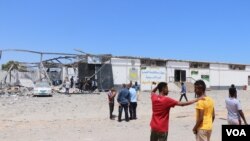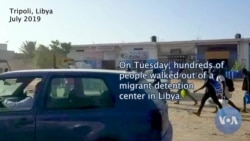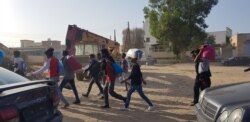"Aid organizations don't protect us from bombs and fear," said one teenager as he walked away from the detention center where he had been held for two years after trying to take a smuggler's boat from Libya to Europe.
He trudged along dusty streets under the hot sun with more than 200 other migrants after they demanded release from the center. Police met their demands, the young man said, by replying, "We won't stop you."
They embarked on a six-hour march that ended at another facility, where exhausted migrants rested after receiving pledges from aid organizations that they would receive help resettling in countries outside their countries of origin and Libya.
Wait and see
On the phone and via social media, the young man shared news of the march and protests over the weekend with VOA, saying they were now planning to wait "a few days" to see if authorities can propose a lasting solution to their situation.
The travelers fled wars, violence and extreme poverty in their home countries, mostly in sub-Saharan Africa. On the road to Libya, many were kidnapped, assaulted or tortured and then detained after risking their lives to try to cross the sea to Europe.
Last week, they were victims of a bombing in the detention center that killed 53 people and wounded at least 130.
The United Nations had warned both sides engaged in Libya's war that civilians were held in the location before the bombing, and the facility had been previously targeted.
Protests
Over the weekend, the detainees who later marched off the premises protested behind the walls of the detention compound. They slept outside, as most of the facility was destroyed. Many reported refusing food as part of a hunger strike.
They carried signs, holding them up for the few secret mobile phone cameras. "We are in a grave," said one sign, while another read, "Save Us From Next Bombing."
In a statement on Wednesday morning, the UNHCR said it "welcomes the decision today to give the remaining detainees in Tajoura the choice to freely leave the detention centre."
Plea for solutions
The organization said it had a plan to relocate the "55 most vulnerable refugees," but it called on the international community to seek solutions for the other 200-plus people now temporarily housed in a facility migrants say is short on food, water and sanitation.
The new location is "a facility for the most vulnerable refugees for whom a solution outside Libya has already been identified," and not suitable for long-term housing, according to the UNHCR.
The young migrant talking to VOA on the phone was unsure if he could leave freely, or why he would leave while waiting for an answer to the most pressing question of his and his fellow-protesters' lives: Will they help them get to Europe?
"There is police at the gate," he said. "Anyway, where should I go?"








